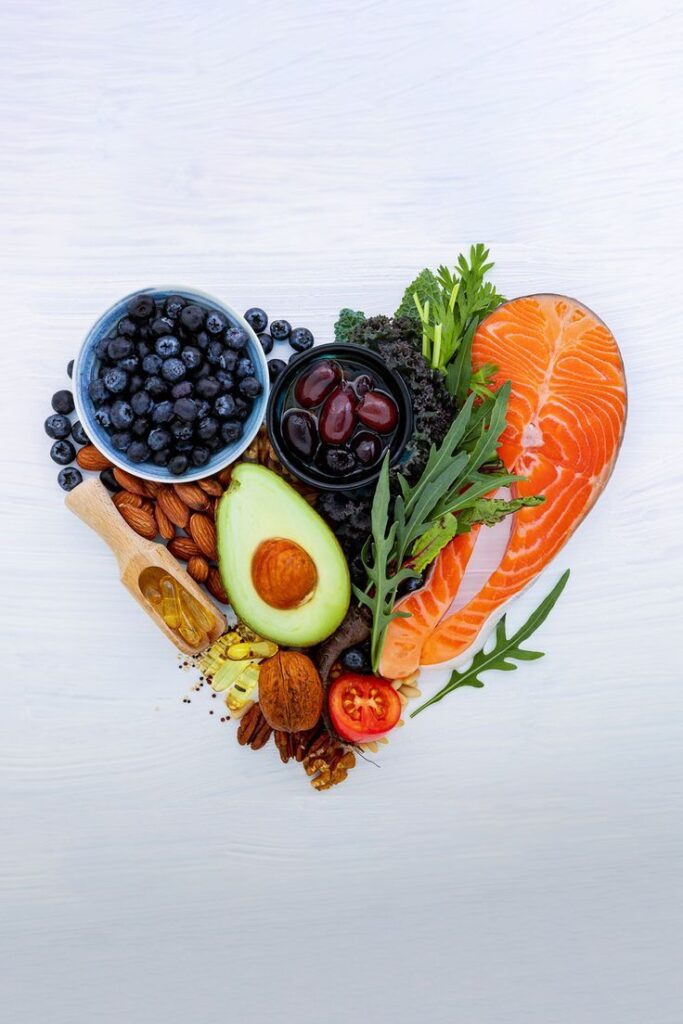Healthy food
While there’s no single magic food for a healthy heart, a combination of nutrient-rich, natural foods can help protect your cardiovascular system. Here are five heart-healthy foods that deserve a regular place in your diet.
1. Fatty Fish – Nature’s Omega-3 Powerhouse
Fatty fish like salmon, mackerel, tuna, and sardines are packed with omega-3 fatty acids, which play a crucial role in lowering triglyceride levels, reducing inflammation, and maintaining a steady heart rhythm. Research shows that omega-3s can reduce the risk of sudden cardiac arrest and stroke.
My Insight:
When I first explored heart health diets, I noticed a common trend among cardiologists—they recommend two servings of fatty fish a week. If you’re vegetarian, flaxseeds or walnuts are good plant-based alternatives. Personally, I like to prepare grilled salmon with a light lemon-garlic seasoning, which not only enhances flavor but also avoids unhealthy saturated fats from heavy frying.

2. Berries – Antioxidant-Rich Superfoods
Blueberries, strawberries, raspberries, and blackberries are bursting with antioxidants like anthocyanins, which help reduce oxidative stress and inflammation in the body—two major contributors to heart disease. Berries also contain fiber, which supports healthy cholesterol levels.
My Insight:
I often recommend adding berries to breakfast bowls, smoothies, or even as a mid-day snack. They’re naturally sweet, making them a healthier alternative to processed desserts. For people with diabetes or blood sugar concerns, pairing berries with a protein source like yogurt can help stabilize glucose levels.
3. Leafy Greens – Nutrient-Dense Heart Protectors
Spinach, kale, and Swiss chard are rich in vitamin K, which helps in proper blood clotting and prevents calcium deposits in the arteries. They also provide dietary nitrates that can help lower blood pressure and improve arterial function.
My Insight:
I’ve seen many people overlook leafy greens because they think salads are boring. But there are creative ways to incorporate them—such as blending spinach into smoothies, sautéing kale with garlic, or adding greens to soups and curries. Personally, I enjoy a warm spinach and mushroom stir-fry as a heart-friendly side dish.
4. Nuts – Small Snacks with Big Benefits
Almonds, walnuts, and pistachios are rich in unsaturated fats, plant sterols, and magnesium, all of which support heart health. Studies show that regular nut consumption can lower LDL (“bad”) cholesterol and increase HDL (“good”) cholesterol.
My Insight:
Portion control is important—about a handful a day is enough to gain benefits without excessive calorie intake. I like keeping a small jar of mixed nuts on my desk for a healthy snack, which helps me avoid processed chips or biscuits during work hours.
5. Whole Grains – Steady Energy for a Healthy Heart
Whole grains like oats, brown rice, quinoa, and whole wheat bread provide fiber that helps lower cholesterol and improve digestion. They also release energy slowly, helping maintain stable blood sugar levels—important for heart health.
My Insight:
Switching from refined grains to whole grains is one of the simplest dietary changes with long-lasting benefits. For breakfast, I often choose overnight oats topped with fruit, or multigrain chapati for lunch. This not only keeps me full but also supports healthy weight management, which is key to heart wellness.
Final Thoughts
From my experience, the key to a heart-healthy diet is consistency—not quick fixes. Including these foods in your daily or weekly meals can gradually improve cardiovascular health and overall energy levels. It’s also important to combine dietary changes with other healthy habits, such as regular exercise, adequate sleep, and stress management.
While these five foods can significantly support heart health, they work best as part of a balanced lifestyle. Small, sustainable changes often lead to the biggest long-term results.
If you’re looking to take the first step today, start with just one addition—maybe a bowl of berries for breakfast or swapping white rice for quinoa—and gradually expand your heart-friendly plate. Your heart will thank you for years to come.
source : http://timesofindia.indiatimes.com/articleshow/123296470.cms?utm_source=contentofinterest&utm_medium=text&utm_campaign=cppst
for more health related news click here
